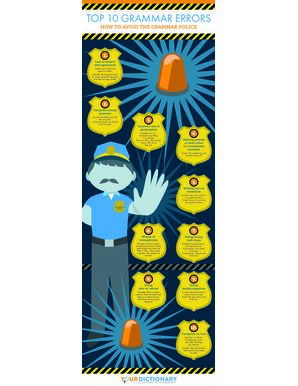

There are countless grammar rules in the English language. From rules on misplaced modifiers and subject/verb agreement to rules on double negatives, there are many guidelines here on YourDictionary for you to follow when writing just about anything. However, one of the best ways to learn correct grammar is to review examples of bad grammar.
1. Verb Tense Errors
Verb tense errors occur when you use the wrong verb tense. They are one of the most common grammar mistakes. The verb tense tells the reader of your sentences when the action is taking place - in the past, the present or the future. You must be consistent on verb tense, unless there's some reason to make a switch to a different tense. Some examples of verb tense errors include:
- I walk to the store and I bought milk. Walk is a present tense verb. Bought is a past tense verb. "Bought" should be "buy," or "walk" should be "walked," since these two events occur at the same time.
- I will eat fish for dinner and drank milk. "Will eat" is a future tense verb, but "drank" is a past tense verb. Since the dinner is going to happen in the future, it is not possible that the milk was drunk already.
- We all eat the fish and then made dessert. "Eat" is a present tense verb, but "made" is past tense.
English verb tenses can be tricky. We've got more help available in our article on classification of verb tenses.
2. Subject-Verb Agreement Errors
The subject of the sentence (the person or thing doing the action) has to agree in number with the verb (the word representing the action). Otherwise, you have an example of bad grammar.
Here are some examples of situations where the subject and verb do not agree with one another:
- Anna and Mike is going skiing. "Anna and Mike" are plural. "Is" is singular. The sentence should read, "Anna and Mike are going skiing."
- Matt like fish. "Matt" is singular; "like" is plural. The sentence should read, "Matt likes fish."
- We enjoys horror movies. "We" is a plural pronoun. The sentence should read, "We enjoy horror movies."
For more help with subject/verb agreement, check out our 20 rules for making subjects and verbs agree and our examples of subject/verb agreement. Once you've studied up, take on our quizzes on subject/verb agreement to check on your progress!
3. Pronoun Errors
Pronouns take the place of nouns in sentences. In order to avoid a grammar error, the pronoun has to agree with the noun that it is replacing. Some examples of bad grammar that occur due to noun/pronoun agreement errors include:
- Anna and Pat are married; he has been together for 20 years. "Anna and Pat" are plural, while "he" is singular. The sentence should read, "Anna and Pat are married; they have been together for 20 years."
- I fed all of her fish, then cleaned its tank. In this sentence, "its" takes the place of the plural phrase "all of her fish." It should use a plural pronoun, as in, "I fed all of her fish, then cleaned their tank."
- When the girls on the team got to the hotel, they dropped off her luggage. "Girls on the team" and "they" confirm that this sentence has a plural subject, so the singular "her" in "her luggage" is wrong. The sentence should read, "When the girls on the team got to the hotel, they dropped off their luggage."
To double check this challenging aspect of English grammar, take a look at our article on pronoun agreement.
4. Double Negatives
Double negatives are a classic example of poor grammar. Some examples include:
- I can't hardly believe what she said. "Can't" and "hardly" are both negative constructions. The proper form is either, "I can't believe what she said" or, "I can hardly believe what she said."
- I don't want no pudding. Technically speaking, since two negatives cancel each other out, saying, "I don't want no pudding" means that you do want pudding. Instead, the sentence should read, "I don't want pudding" or, "I don't want any pudding."
- I won't do nothing. In English, saying "I won't do nothing" is synonymous with "I will do something." To express a negative, the sentence should read "I will do nothing."
Not every language handles double negatives the same way. Happily, English consistently treats double negatives as a positive. Review our list of double negative rules and tips for more.
5. Sentence Fragments
A sentence requires at least a subject and a verb, and sometimes an object. If it fails to do so, then it is a sentence fragment. Sentence fragments are bad grammar, and some examples of sentence fragments include the following:
- Because I ate dinner. This is a sentence fragment because it doesn't express a complete thought. What happened because you ate dinner?
- I accidentally. You accidentally what? Lacking a verb and an object, the reader simply doesn't understand what the sentence is meant to say.
- Jumped high. This is a sentence fragment because the reader does not know who jumped high.
For more help in making your sentences complete, review our article on correcting sentence fragments.
6. Run-On Sentences and Comma Splices
A run-on sentence is a sentence in which two or more independent clauses (sentences that could stand on their own) are joined together improperly. A subset of run-on sentences is the comma splice. That's when two independent clauses are joined by a comma. For example:
- I went to the store I got milk and cookies. Both "I went to the store" and "I got milk and cookies" are independent clauses. To avoid a run-on sentence, either link the two with a semicolon - "I went to the store; I got milk and cookies" - or break them into two separate sentences.
- We drove all day in the van, we drove 206 miles to get to our cabin. This is a textbook comma splice. "We drove all day in the van" and "We drove 206 miles to get to our cabin" could be standalone sentences and should not be joined with a simple comma.
- We got to the cabin and we unpacked our things and we built a campfire and we made dinner and we slept under the stars. This is an example of polysyndeton, the overuse of conjunctions: in this case, the word "and" is used four times. Polysyndeton can be a deliberate literary device, but in this case, it's simply overextending the sentence.
For more lessons in what not to do, check out our examples of run-on sentences.
7. Misplaced and Dangling Modifiers
Learning the proper placement of modifiers is vital to English syntax. Even experts in English speech and writing have the occasional dangling or misplaced modifier in their work. Here are some examples:
- Frustrated, the chairs took me forever to set up. A modifier must always be as close as possible to the thing it modifies. Since the speaker in the sentence is frustrated (not the chairs), the sentence should put the speaker and the modifier closer together. For example, "I was frustrated by how long the chairs took me to set up."
- When they were finally all together, students draped the chairs in bunting. This is a classic dangling modifier, as the phrase "when they were finally all together" could modify "students" or "chairs."
- Sleeping in the orchard, a serpent stung me. Remember how we said misplaced modifiers could happen to anyone, even experts? That's William Shakespeare himself with a dangling modifier: was the serpent or the speaker sleeping in the orchard?
Modifiers can be tricky, which is why we've invested lots of time and work into explaining them. We have plenty of examples of misplaced modifiers, plus advice on how to place modifiers in general. Need help with dangling modifiers in particular? No problem! Have a look at these examples of dangling modifiers, too.
8. Apostrophes
As apostrophes serve two important and very different functions in English - either to form a conjunction or to make a word possessive - they can be very easy to use incorrectly.
- The girls's soccer game was delayed by rain. This is the classic error in forming a possessive with an apostrophe. Plural nouns require only an apostrophe to be possessive, not an apostrophe and an "s." The sentence should read, "The girls' soccer game was delayed by rain."
- The team' striker scored the winning goal. This error is the reverse of the above. Even though there are multiple girls, there is only one team, so it is treated as singular. Thus, the sentence should refer to the team's striker."
- Its the team's first win this season. Its and it's may be the most commonly confused words in English. And, it all comes down to an apostrophe. "Its" means "belonging to it." "It's" is a contraction of "it is." Remember, unless you can replace it with the words "it is," it should be spelled "its."
There's more to apostrophe use in English than is addressed in this short article. Explore the subject in depth by studying these apostrophe rules and examples of when not to use an apostrophe.
9. Overuse of Prepositional Phrases
A prepositional phrase is a phrase starting with a preposition. They're fundamental to written English. In fact, "to written English" is itself a prepositional phrase! They are generally used to add context (as above) or to provide additional information. However, like any grammatical construct, prepositional phrases can be misused. Consider this sentence:
With malice toward none, toward future dietary decisions, beyond any desire for alternate meals, I made a sandwich.
This is a deliberately silly - we might say hyperbolic - example of a real problem in writing. Using too many prepositional phrases weighs down your writing without adding anything important.
Read our in-depth analysis of prepositional phrases for more on this topic.
10. Confusing Words
English is rich in homonyms, homophones, homographs and just plain confusing word choices. Learning these sometimes subtle differences is the mark of a true master of the language.
- Since your going out, you should check the weather on you're phone.
This sentence has "your" and "you're" backward. "Your" is a possessive; it means "something belonging to you." "You're" is a contraction; it means "you are." - There car broke down so their hitching a ride to they're class.
The writer has confused there, an adverb meaning "at that place"; their, an adjective meaning "belonging to them"; and "they're," a contraction of the pronoun "they" and the verb "are." - Can they ride home with you? I won't drive them because my car is in the shop.
The difference between "can," "may," and "will" is often disregarded in conversation, but important to get right in formal writing. In English, "can" refers to actual physical ability. "May" is often used to ask a person for their permission. "Will" means that something is guaranteed to happen. The sentence above should read, "May they ride home with you? I can't drive them because my car is in the shop."
We've collected some repeat offenders when it comes to confusing word choices. Take a look at our list and some of the strangeness of English should become clearer for you.

Checking Your Grammar
These are just a few of the many examples of bad grammar. The best way to make sure your own writing is free of poor grammar is to learn the grammar rules for the different parts of speech and how they fit together.
For more review of special kinds of grammatical errors, take a look at our 7 grammar rules you can break!